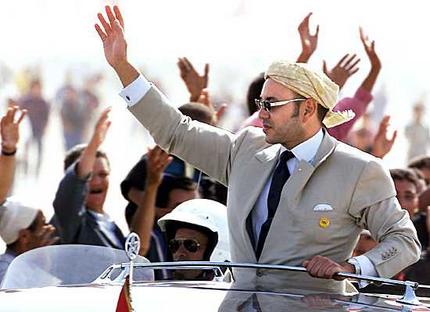By Mohammad El-Ashab
 King Mohammed VI
King Mohammed VI
When
King Mohammed VI addressed the Abderrahim Bouabid Foundation, calling for a democratic
solution to emerge from this dark tunnel, he was hinting at the growing role of
the youth and the elites of society, and their engagement in the fight for
change.
The
King was then still the heir to the throne, and his views were characterized by
a great deal of openness and the desire to get rid of the obstacles that are
preventing the country from joining the club of emerging democracies. It thus
came as no surprise for his earliest decisions, after ascending the throne, to
be dedicated to clearing the air by lifting house arrest from the leader of the
Al Adl wal Ihsane (Justice and Charity) organization, Abdesslam Yassine,
allowing for the return of those forcefully or voluntarily exiled, and toppling
the empire of the Interior Ministry, so that it may be like any other sector,
fangless and abiding by the authority of the law.
Such
views, which aimed at improving Morocco’s record on issues of human rights,
were actively echoed among the youth, as young people began to get the feeling
that there was someone speaking loudly of the kinds of aspirations that
preoccupy them, without mediators.
It
was a positive course of action par excellence. Few paid heed to the fact that
bringing together the aspirations of the new generation and the reform of the
political scene, on a background of reduced tension and of getting rid of the
iron fist mentality, was meant to plant the seeds of hope in fertile soil, with
the potential to produce a social project that would carry the features of
identity and of the future.
Perhaps
the most prominent characteristic of the official discourse, being issued from
the highest positions, is the fact that it does not fall within the context of
electoral campaigns or political outbidding, as much as it reflects a serious
style and methodology in dealing with public affairs.
Yet
the shining image of profound changes has begun to be overshadowed by
exhaustion and the absence of maintenance.
Indeed,
ideas and follow-ups are also subjected to having the extent they have reached
investigated. Did it have repercussions and produce new trends within public
opinion? And did it maintain the momentum of the speed of execution required?
King
Mohammed VI did not need reports to realize that the fight against poverty,
illiteracy and all forms of marginalization was his own battle, being waged on
several fronts. He certainly did not need to adhere to the concerns of the new
generation, the young people who represents the best political, economic and
cultural investment in the human aspect, because he is one of them, and because
his discourse and the steps he is taking carry a particular meaning in this
context.
Logically
speaking, the youth February 20 Movement is not saying anything other than what
the Moroccan street is thinking, whether out loud or in whispers. Indeed, it is
a part of this street, having emerged from its interactions and having managed
to muster the courage to speak honestly of what is on people’s minds. It is
tantamount to a popular parliament monitoring the government and the state, and
speaking publicly of the weaknesses and flaws in managing pending issues.
In
this sense, it is closer to a conscience awakening, speaking shamelessly and
criticizing the disgraceful behavior that seeks to depart from the democratic
course. It is lucky for Morocco that a movement with such momentum has
proclaimed its existence at the right time. Yet, like any outburst of anger, it
can attract attention or attempts to rally, regardless of its background and of
its motives. And if it is accused of being radical or unable to control the
course of events, its excuse is that it is not a political party and is not
waging elections for seats. It expresses states of frustration, despair and
aspiration that should be heard, whatever the disagreements. And it is better
to listen to painful criticism than to rest idly amidst verbose praise.
No
protest movement is unconnected to the interactions and contradictions taking
place around it, and the essence of protest is that it comes only from a
deepened feeling that unsound things are going on. This happens even in
countries with venerable democratic traditions, where many youth movements have
emerged from their universities and streets in anger, revolution and a change
of direction.
Inasmuch
as Morocco has been able to contain the emotions and the movements of the
street, on the background of contagious social phenomena, particularly by
ratifying a series of comprehensive reforms, it has begun to be dominated by
the conviction that it has done everything that needed to be done and more. And
although such a conviction is reinforced by pertinent reasons, pondering such
reasons should be the starting point for new wagers. Indeed, the danger does
not lie in the spread of protest movements, which are in and of themselves
considered to be vital, positive and required. Rather, it lies in raising
barriers and fences that alter the view to the street, by characterizing it as
something that it is not.
It
is once again lucky for Morocco that its young people are leading a positive
movement that sings of facts, even when they are shocking. And the fight
against corruption remains that of all Moroccans, who yearn to consecrate the
values of justice and dignity. As for those who dabble in the falsification of
facts and reality, they view such a movement through goggles that lack
far-sightedness.
This commentary was published in al-Hayat on 29/09/2011
No comments:
Post a Comment